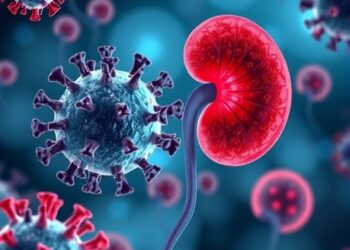In a groundbreaking study that could redefine our understanding of breast cancer biology, researchers have unveiled the pivotal role of mast cell tryptase in modulating nuclear architecture and suppressing cell proliferation. This novel insight challenges conventional perspectives on tumor progression and opens new avenues for targeted therapeutics in oncology. The investigation, recently published in Cell Death Discovery, meticulously deciphers how the proteolytic enzyme tryptase, secreted by mast cells, orchestrates profound changes within breast cancer cells, culminating in attenuated growth rates.
Mast cells, traditionally recognized for their roles in allergic responses and immune surveillance, are now emerging as influential players in the tumor microenvironment. Among their biochemical arsenal, tryptase—a serine protease packed in mast cell granules—has attracted attention for its ability to interact with extracellular and intracellular substrates, eliciting diverse biological outcomes. This latest inquiry delves deeply into how tryptase penetrates breast cancer cells and triggers a cascade of nuclear remodeling events that compromise proliferative capacity.
At the cellular level, cancer cells are notorious for their capacity to hijack nuclear mechanisms, optimizing gene expression patterns to support unchecked division and survival. The discovery that mast cell tryptase influences nuclear morphology and organization introduces a novel regulatory checkpoint. Utilizing advanced imaging techniques and molecular assays, the study demonstrates that exposure to tryptase results in alterations in nuclear shape, chromatin condensation, and nucleolar architecture—hallmarks indicative of a shift toward a less proliferative state.
One of the most striking revelations pertains to how tryptase-mediated nuclear remodeling intersects with cell cycle regulation. Detailed flow cytometric analyses reveal that breast cancer cells treated with tryptase exhibit arrest predominantly in the G1 phase, suggesting an enforced cell cycle checkpoint activation. The mechanistic underpinnings appear linked to modifications in the expression and activity of cyclins and cyclin-dependent kinases, orchestrated downstream of the nuclear changes induced by tryptase activity. This points to an intrinsic tumor-suppressive function exerted by mast cell-derived tryptase.
Furthermore, the research highlights that the reduced growth in breast cancer cells is not merely a consequence of cytotoxicity but results from a finely tuned reprogramming of the nuclear environment. Transcriptomic profiling uncovers widespread downregulation of proliferative genes alongside upregulation of differentiation-associated pathways. The ability of tryptase to modulate gene regulatory networks through nuclear architecture remodeling may represent an evolutionary conserved mechanism leveraging mast cell functions to restrain tumor expansion.
Another facet explored concerns the interplay between tryptase and components of the nuclear matrix and lamina. Immunoprecipitation and confocal microscopy data reveal that tryptase physically associates with lamin B1 and other nuclear scaffold proteins, destabilizing interactions critical for maintaining oncogenic chromatin states. This structural disruption sets the stage for epigenetic reprogramming that limits the oncogenic potential of breast cancer cells, a concept that could revolutionize epigenetic therapy strategies.
The implications of these findings extend beyond basic cancer cell biology. Given the increasing recognition of the tumor microenvironment as a critical determinant of cancer progression, understanding how mast cell products like tryptase influence tumor dynamics is vital. The identification of tryptase as a natural modulator providing growth restraint heralds the potential for harnessing or mimicking its activity therapeutically. This could complement current treatments, offering a mode to suppress tumor growth through modulation of nuclear architecture rather than conventional cytotoxic approaches.
Moreover, the study’s innovative use of high-resolution live-cell imaging and proteolytic activity assays sets a new methodological standard in the field. Visualizing the temporospatial dynamics of tryptase entry into cancer cell nuclei and mapping consequent remodeling events provides unparalleled insight into the enzyme’s intracellular journey and functional impact. These techniques not only corroborate findings but pave the way for real-time monitoring of therapeutic interventions targeting nuclear remodeling.
Intriguingly, the research also touches on potential differential effects of tryptase among various breast cancer subtypes. Preliminary data suggest that triple-negative breast cancer cells may exhibit a distinct sensitivity profile compared to hormone receptor-positive counterparts, prompting further investigation into subtype-specific nuclear vulnerabilities exploitable by tryptase or analogous agents. Such nuances underscore the importance of personalized approaches in cancer treatment informed by tumor biology.
In conclusion, this transformative research positions mast cell tryptase as a multifaceted regulator within the breast cancer microenvironment, capable of invoking nuclear remodeling to suppress tumor cell proliferation. By decoding this complex biological interplay, the study provides a compelling framework for future therapeutic development, emphasizing the untapped potential of immune cell proteases in cancer control. As oncology continues to evolve toward targeted and precision medicine, these findings illuminate a promising frontier at the intersection of immunology, nuclear biology, and cancer therapeutics.
The convergence of these insights signals a paradigm shift, encouraging researchers and clinicians alike to reconsider the role of immune components in oncology not as mere bystanders but as active modulators of tumor fate. Further exploration of mast cell-derived factors, including tryptase, may yield innovative strategies to curtail cancer progression through manipulation of nuclear architecture—a concept poised to inspire a new era of cancer interventions that are as elegant as they are effective.
Subject of Research: Mast cell tryptase’s role in nuclear remodeling and growth suppression of breast cancer cells
Article Title: Mast cell tryptase induces nuclear remodelling and reduced growth in breast cancer cells
Article References:
Pano, F., Bub, L., Parrine, D. et al. Mast cell tryptase induces nuclear remodelling and reduced growth in breast cancer cells. Cell Death Discov. 11, 485 (2025). https://doi.org/10.1038/s41420-025-02813-1
Image Credits: AI Generated




